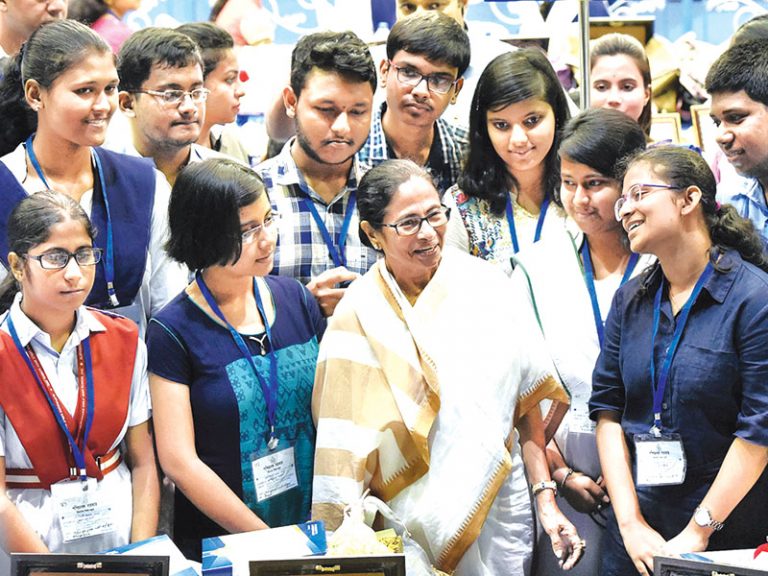West Bengal: U-turn surprise
Baishali Mukherjee (Kolkata)
After procrastinating for several months over the issue of implementation of the National Education Policy (NEP) 2020, West Bengal’s Trinamool Congress (TMC) government has signalled a rejig of its strategy. In what is being interpreted as a sudden softening of its opposition to NEP 2020, on March 17, the higher education department wrote to registrars of all state universities to introduce the “new curriculum and credit framework” in compliance with NEP 2020 recommendations for four-year undergraduate programmes in the forthcoming academic year starting July.
The state government’s decision came after the secretary of the University Grants Commission (UGC) wrote to it on January 31, asking it to implement NEP guidelines. Currently, West Bengal’s 20 state-aided universities, 49 government-owned and 433 government-aided degree colleges and 11 private universities offer three-year undergraduate programmes.
Soon after the announcement, on March 27, the state government set up a 10-member committee comprising Bankura University VC Deb Narayan Bandyopadhyay, North Bengal University VC Om Prakash Mishra, Rabindra Bharati University VC Nirmalya Narayan Chakraborty, under the chairmanship of Jadavpur University VC Suranjan Das, to get feedback about NEP and formulate a higher education policy tailored to the needs and interests of West Bengal. The committee will submit its report by May end.
The sudden U-turn of the state government in accepting the BJP government at the Centre’s diktat has startled the stakeholders of education in West Bengal (pop.91 million), including teachers’ associations, educationists and students. They are miffed that the announcement was made without teachers and professors being taken into confidence, ambiguity in the directive over what will become of the two-year Master’s programme, and also that learning compulsory yoga has found place in the directive. Additionally, there is concern that the four-year undergrad programme could result in more dropouts, corporatisation of the education sector, and reduced role of state governments, enabling the Centre to acquire more power in education, contrary to the spirit of the Constitution of India.
Academics of leading colleges of Kolkata are also voicing concern regarding implementing NEP from July as they feel that faculty shortages — according to them, nearly 2,000 assistant professors and 100 principals posts are vacant in government colleges, along with lack of adequate infrastructure including availability of classrooms to accommodate students for two extra semesters — will stymie introduction of the four-year undergrad degree programme.
Academy dons express surprise that the same TMC government which was opposed to NEP 2020, and described it as an RSS agenda to impose Hindi and standardised curriculums on all states against the spirit of federalism, is suddenly in love with NEP 2020. “NEP 2020 will encourage corporatisation of the education system and destroy the state-funded education sector from school to university levels. In a vast country like India, which has diversified socio-economic conditions, a common yardstick cannot be applied to all states,” thundered former but now disgraced education minister Partha Chatterjee. Moreover last year, Bratya Basu, who replaced Partha Chatterjee as the education minister in 2021, had said that the state government would devise its own NEP instead of adopting NEP 2020.
Similarly chief minister Mamata Banerjee had awarded NEP 2020 a mere 10-12 percent score. Her objections to the new policy were that numerous suggestions in the Kasturirangan Committee’s policy draft were not included, and that the multiple regulatory committees proposed to be established will drive up administrative expenses. Moreover, she was aggrieved that no educationist from West Bengal was included in the Kasturirangan Committee constituted by the Centre to write the NEP draft.
Opposition parties in Bengal allege that the TMC has gone soft on the BJP government at the Centre because it has entered into a tacit understanding with the latter that it will shield top TMC leaders from corruption charges in the Rs.400-500 crore teachers’ recruitment scam being investigated by CBI and the Enforcement Directorate (ED), controlled by the BJP government at the Centre.
Meanwhile, the Left-affiliated Students’ Federation of India (SFI) has called for massive students’ protests against the sudden U-turn decision of the TMC government. SFI West Bengal unit’s president, Pratikur Rehman, says the system of on-and-off education (with multiple entry and exit points) and credits in an Academic Bank of Credits has been designed to make education very expensive. “Only rich and affluent students will be able to afford higher education while students from low-income backgrounds will drop out in large numbers,” he says.
Amidst rising public anger against the authoritarianism and corruption charges against the TMC government, the abrupt decision to implement the NEP recommended four-year degree programme for undergraduate education in the state is fuelling public anger against the TMC. The inability of the TMC government now in its third consecutive term in office to raise primary education standards because of recurring teacher recruitment scandals and high court stay orders has not only disillusioned Kolkata’s influential bhadralok (cultured middle class) but is also spreading to grassroots voters. This is badly hurting chief minister Mamata Banerjee’s projected image as a mass leader at a time when she has set her sights on winning all West Bengal seats in the General Election next year.

















Add comment